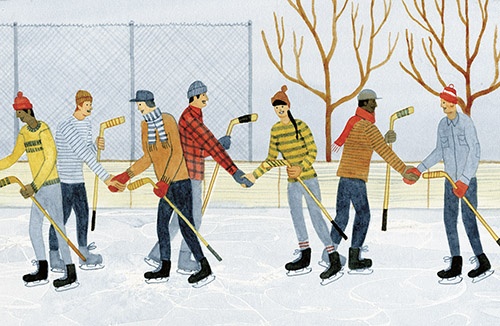 Illustration by Genevieve Simms.
Illustration by Genevieve Simms.
Home Ice
Letter from Montreal.
As I pulled up to my fırst apartment in Montreal, my boyfriend appeared on the second-storey balcony, waving, as if on cue. I was in my early twenties, and my parents, in a show of supportiveness, had spent Labour Day ferrying me east along the 401, all the way from my hometown in southern Ontario to a postwar sixplex in La Petite-Patrie.
I had moved for love, and my boyfriend, Simon-Pierre, was ready to return the favour by helping me lug my stuff up the stairs—including a black canvas wheelie bag spacious enough to conceal a body.
“What’s this?” asked Simon-Pierre, unzipping it in our foyer. He peered at its contents: padded shorts, a neck guard, a sweat-stained pelvic protector.
“I play hockey,” I said. We’d met while tree-planting, and some details from our everyday lives had never surfaced.
How’s this for a Canadian cliché: my family celebrates Christmas by renting out an ice rink to play pick-up. Five-year-olds play alongside fifty-five-year-olds, women among men. We keep score. An ex-figure skater, I swapped my leotards for a jersey at thirteen; at my first hockey practice, I kept rolling off the rounded toe of my new skates. My new, black skates—how transgressive. I played in an all-girls minor league until university, when I joined a co-ed intramural league. Over the years, hockey became more than just something I did. It became part of my identity. Figure skating had been all poise, but hockey was primal.
Those fırst few months in Montreal, I asked around about a women’s league. But Simon-Pierre, who’d never brandished a stick in his life, was part of an artsy coterie that turned up scant leads. As fall gave way to my first Montreal winter, I took solitary walks near my new apartment. One day, about a block away, I came upon an outdoor rink in a park and paused to watch the late-afternoon mêlée.
Players in their late teens and twenties whipped around the ice, steam emanating from their exposed cheeks. Occasionally, one of them would let out a grunt—a truncated battle cry. The grind of their blades and the clatter of their sticks reminded me of my childhood, of evenings spent in the artificial deep-freeze of the arena. But there was one difference: they were all men. I thought about coming back with my skates, but as I turned towards home, I knew I wouldn’t.
I passed that rink often, but I never saw another woman there. It was Les Boys—not exactly shocking, but coupled with the lack of a women’s league, it made me curious. Could a province that had produced greats like Manon Rheaume, Kim St-Pierre, and Caroline Ouellette actually not be such a great place to be a hockeyeuse?
Simon-Pierre and I were in his car on our way to a holiday dinner when I heard an interview on Radio-Canada with a journalist named Lynda Baril, who’d just written a book on the history of women’s hockey in Quebec. A century ago, she explained, the province’s fırst female players were Anglo-Saxons. The Catholic Church actually forbade French-Canadian women from playing hockey, which they deemed unfeminine. Was that the legacy I was noticing at my local patinoire?
It bothered me that I couldn’t bring myself to just join the game. I was a strong, scrappy skater. I suspected the problem was my newly acquired fısh-out-of-water status. I was the odd one out, the anglophone among Simon-Pierre’s friends and family. Perhaps I didn’t want to be the odd one out on the ice, too.
It was only a few years later, when my parents gave Simon-Pierre a pair of hockey skates for Christmas, that suddenly, things changed—he wanted to play, too. In January, we met some friends at the outdoor rink, throwing our sticks down at centre ice along with the others. A scruffy-faced guy in a plaid jacket sorted the sticks into two piles.
Then the puck dropped, and my face prickled with the cold air as I picked up speed and followed it deep into the corner. Someone was behind me in a second, digging at my skates. An elbow pressed into my back as I flicked the puck up the boards. The game moved fast, flipping from one end of the small rink to the other in the blink of an eye. Without equipment, it was rough, but I didn’t mind. In every tussle I could feel how deeply I’d missed playing. If the men on the ice cared that I was a woman, I didn’t notice—because for that brief game, I forgot, too.





